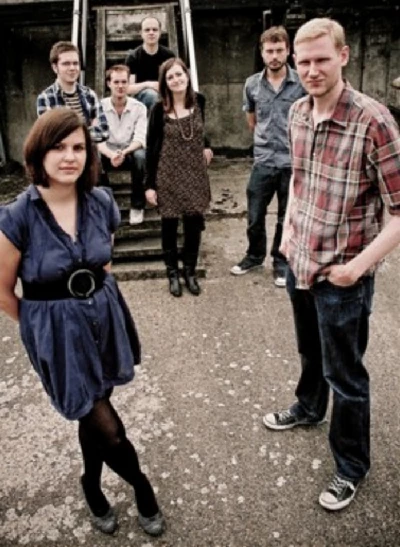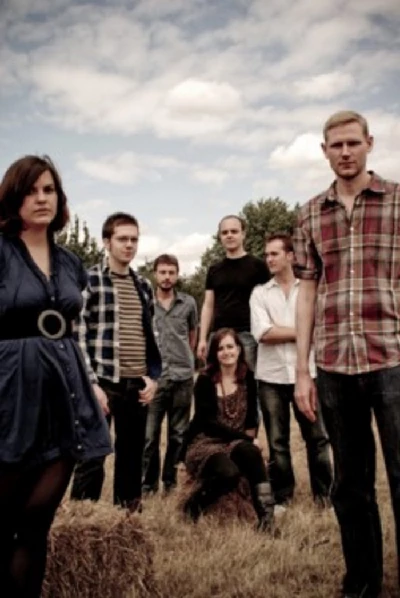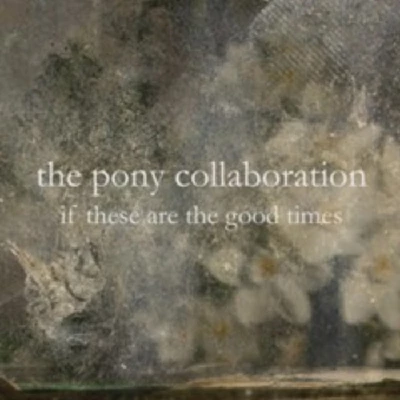published: 13 /
2 /
2010

John Clarkson talks to Pony Collaboration front man James Scallan about 'If These are the Good Times', the second album of his band, who will be playing the Pennyblackmusic Bands Night in March, and about how with a membership of ten who live in both Cambridge and London they get together for gigs
Article
The Pony Collaboration are a Cambridge and London-based group, which currently extends to a membership of ten.
The group is currently centered around the gravel-toned vocals of songwriter and guitarist James Scallan and those of the sweet and light-voiced Ellie Walker. They have now released two albums on Series 8 records, 2007's 'The Pony Collaboration' and last year's 'If These are the Good Times'.
The Pony Collaboration employs both a pianist and a strings section as well as guitarists and a drummer. Their music has a swooning sound, but as a result of the band's carefully-crafted and meticulous arrangements is also beautifully under-stated.
The Pony Collaboration will be playing the Pennyblackmusic Bands Night at the Half Moon in Herne Hill, London on March 20th.
James Scallan spoke to Pennyblackmusic about his group and began by talking about how, with such a large and geographically spread-out line-up, it gets together for rehearsals and to play gigs.
PB: Your MySpace site lists the Pony Collaboration as having ten members, who live in both Cambridge and London. This must make touring and rehearsing very hard. It also says on your website that there was an occasion in which you didn’t play in the same room together for six months. How do you get around this? Do different branches of the band just play together when they can?
JS: It’s more straightforward than you might think. At least five of us get together pretty much every weekend to write or rehearse. We’re like the musical equivalent of a pub football team. We do have a lot of members, but not all of them are currently ‘active’.
For example, Yusuf, our viola player now lives Dubai, but we still consider him to be a member of the band. He’s only spent two weeks in the country in the last couple of years, but he managed to fit in a gig with us during that time.
I do remember one occasion where two members of the band hadn’t met each other prior to performing on stage together, but that was an isolated incident. I think the six months that you’re referring to was when we were recording our first album. Some members of the band finished recording their parts within the first couple of weeks. The rest of us continued to piss about for the best part of a year and we didn’t rehearse or play live for that entire period.
PB: How does this affect tours and gigs? Does the line-up fluctuate a lot when you are on stage together? How many of you can we expect to see at the Pennyblackmusic Bands Night on March 20th?
JS: Touring is difficult. We’re an expensive band to keep on the road and we’re not really in a position to ask for enough money to break even. Over the last few months, we’ve played one off gigs all over the country and have driven home afterwards and gone into work the next day. It’s brutal at times, but it’s the only way we’re able to make it work. The line-up does fluctuate slightly when we play live. I think there will be seven of us at the gig on March 20th, which is slightly above average.
PB: The group apparently enjoy talking about themselves in the third person. As the title of your latest album ‘If These are the Good Times’ suggests, a lot of your songs are fairly bleak with one or two tracks such as ‘I Never Knew’ and ‘Monopoly in Sound’ proving slightly more upbeat. In light of that, how many of your songs are based on personal experience and how many of them are drawn from imagination?
JS: I try to avoid writing from personal experience as much as possible. I lead a fairly sedentary lifestyle so it wouldn’t leave me with an awful lot to work with. I also find it helpful to remain slightly detached from the subject matter. I think emotional honesty is overrated.
PB: It says in the booklet that accompanies ‘If These are the Good Times’ that the songs are started are by you, James, and then finished by the band. At what point do you hand a song over to the band and when with all these different musicians involved do you declare it finished?
JS: It varies. Sometimes I bring in a song that I consider to be finished and try to bully everyone into doing exactly what I say (this rarely works). Sometimes I bring in a few words and a basic chord progression and we hammer away at it until we’ve got something interesting. I don’t think we consider a song to be properly finished until it’s been released. Even then, we might be tempted to work on a new arrangement to play live.
PB: Your songs are all curiously understated, and considering the amount of musicians and instruments involved surprisingly subtle and restrained. Why did you decide to go for such minimal effects? Do you feel that understatement and actually letting the instruments breath as you have done with this record is far better than aiming for more and suffering potential overkill?
JS: We haven’t always been so restrained. An early live review described us as “trying to make a chocolate soufflé when a chocolate pudding would do”, which I thought was pretty funny. I suppose we’ve been together for quite a long time now and we’ve definitely got better at playing as a band.
There’s an element of self sacrifice to it. We try to put the song first even if it means one of us having to play a slightly less interesting part. We spend a lot of time working on the arrangements of our songs and we’re definitely conscious of not wanting them to sound too cluttered. I wouldn’t say it’s a ‘better’ approach.
I’m a big fan of Broken Social Scene, who seem to throw everything into the mix and create more of a ‘wall of sound’ type effect. That’s probably more fun, but I don’t think it would have suited the songs on this album.
PB: Music critics have had a difficult time categorising you. You have been described as everything from a “countrified Tindersticks” to having “the best bits of smart 80s pop” and have drawn favourable comparisons as well with bands like Badly Drawn Boy and Belle and Sebastian. How would you describe yourselves?
JS: We’ve flirted with a few different genres over the years but I’ve resorted to describing us as ‘indie pop’, which is at least half true. We’re independent but not all that popular.
PB: The Pony Collaboration was born out of the ashes of another Cambridge group, Return Of Id. Who were they?
JS: Return Of Id were a band I was in with Tom and Michael from The Pony Collaboration when we were at sixth-form college in Cambridge. We released a couple of singles that received a small amount of airplay from John Peel and Steve Lamacq (which went straight to our heads) and we split up shortly afterwards. We were only around for a couple of years and I don’t think anyone really remembers us, which is probably just as well.
PB: Claire Williams shared lead vocals with you on the first album, but Ellie Walker has taken over a lot of the main vocals on this album. There is a real sense of dark and light on the album between your deep vocals and her more sweet ones. Where did you discover Ellie, and why does Claire just appear on backing vocals on this album?
JS: Like Yusuf, I would still consider Claire to be a member of the band. However, by the time we started recording this album, her other commitments meant that she was no longer able to play an active role.
Ellie is a talented singer-songwriter in her own right and we knew her from playing gigs together in Cambridge. She was the first person we thought of when we started looking for another singer. Ellie joined the band halfway through the recording of the album and we asked Claire to come in and do some backing vocals because she already knew the songs and we were keen for her to still be involved in some capacity.
PB: ‘If These are the Good Times’ followed on three years after ‘The Pony Collaboration’ and was, as you again say on your website, much delayed. Why did it take so long to come out?
JS: It’s a long and not particularly interesting story. We recorded the first album because we’d already been together for a couple of years and we wanted to document the songs that we’d been working on during that time. I don’t think we ever thought it would get a proper release, I certainly don’t remember sending it to any record labels.
A friend of ours played it to Trevor from Series 8 Records, who seemed to like it and offered to put it out, but by the time it was released it was already well over a year old. We then spent most of 2007 promoting the first album and most of 2008 recording the second one.
By this point, Series 8 was no longer active as a label, but they allowed us to use their infrastructure to release it ourselves. This took slightly longer than we expected (I had no idea there was so much admin involved). We’ve already pretty much finished writing our next album, but I’ve no idea when that will see the light of day.
PB: Finally what can we expect from you at the Pennyblackmusic Bands Night?
JS: We’ll be playing songs from our long and not particularly illustrious career and trying not to get too drunk.
PB: Thank you.
Picture Gallery:-

